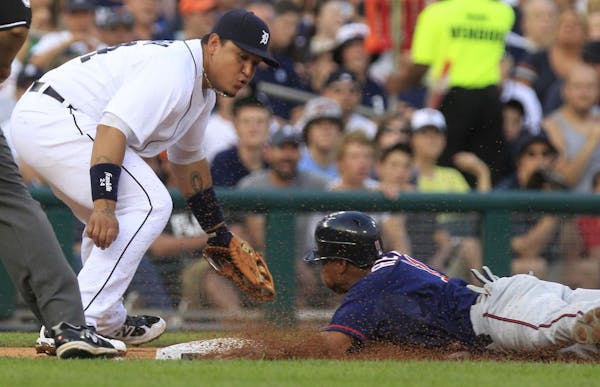The standings tell us that Terry Ryan, in the first eight months of his second stint as the Twins general manager, has taken a last-place team and transformed it into ... a last-place team.
The last two months hint at a more layered story, one of respectability regained and promise restored.
At the end of the 2011 season, the Twins were adrift as an organization. They could no longer take pride in developing fundamentally sound players or making shrewd, forward-looking decisions.
They began the year with expectations of making the playoffs and by November were looking to replace GM Bill Smith while wondering how a team with a franchise-record payroll and a new ballpark could suddenly find itself looking up at the perpetually woeful Kansas City Royals.
On May 15 this season, the Twins were 10-26, giving them a record of 73-125 since the beginning of the 2011 season -- a winning percentage of .369. Since then, the Twins have gone 26-23 as Ryan's offseason moves and the emergence of key young players have made the team watchable again.
That Ryan has made so many positive moves in a short time without elevating his team into contention speaks to the disarray in which the Twins found themselves.
Ryan signed Josh Willingham to a three-year contract worth $21 million, making Willingham one of baseball's best bargains. He signed Ryan Doumit for one year at $3 million, and when Doumit proved an ideal fit as Joe Mauer's backup, Ryan signed him to a two-year extension.
Ryan signed Jamey Carroll, who has improved the Twins' fielding, and Jared Burton, who has become a vital reliever. This year, those four players are making less than $14 million combined.
Joe Mauer has re-established himself as an everyday player and an All-Star. Justin Morneau, following two years of concussion problems, has proved durable and eager to play first base. Trevor Plouffe, a bust at shortstop last season, has become a potential All-Star third baseman. Scott Diamond, the best Rule 5 draftee to grace the Twins roster since Johan Santana, has become a de facto ace. Ben Revere has proved himself as an everyday player.
Young starters P.J. Walters and Cole De Vries have displayed promise and composure, and potential future ace Kyle Gibson has begun throwing again after Tommy John surgery. The farm system is producing a number of promising position players, from Aaron Hicks to Miguel Sano.
Just as important, the Twins have regained a measure of self-respect. They are not evoking memories of the 1970 Orioles, but they have improved dramatically in the field since last season, with Plouffe and Brian Dozier becoming possible long-term answers on the left side of the infield.
These encouraging signs have been obscured by a rotation that has compiled the second-worst ERA in the majors, at 5.68.
When Ryan turned the Twins around in the early 2000s, he did so with a series of trades that landed young pitchers such as Santana, Joe Mays, Eric Milton, Kyle Lohse, Joe Nathan and Carlos Silva.
Ryan might need to work such miracles again. The two most celebrated methods for acquiring aces, via first-round draft picks and exorbitant free-agent contracts, have never worked for the Twins.
The list of pitchers taken by the Twins in the first round reads like an independent-league roster. The Twins have never taken a pitcher in the first round who represented them in an All-Star game. The best on the list are Glen Perkins, now a reliever, and Matt Garza, who was traded. The rest are Adam Johnsons, Mark Redmans and Marc Barcelos.
Nor have the Twins ever signed a high-priced ace as a free agent. Jack Morris was a bargain who overachieved near the end of his career. With Mauer earning $23 million a year, the $25 million or so a year it would take to land a premier free agent pitcher would leave the Twins, under the Pohlads' budget, little room to fill out a quality roster and heavily dependent on the pitcher remaining healthy.
Ryan has helped dramatically improve the Twins in a short period of time. To make them contenders, he will probably have to rely more on his pitching divining rod than the Pohlads' checkbook.
Jim Souhan can be heard Sundays from 10 a.m. to noon and weekdays at 2 p.m. on 1500-AM. His Twitter name is SouhanStrib. • jsouhan@startribune.com

Souhan: This is KAT's chance to prove Flip Saunders was right

Souhan: Why Tiger Woods should keep swinging
Souhan: Scheffler wins Masters again, shows what makes him special
Morikawa falters in final round at Masters


